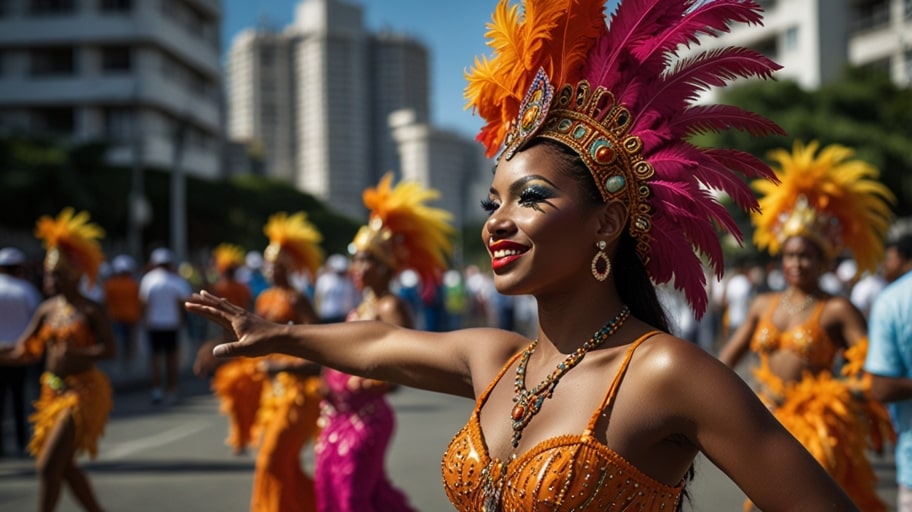Currently, Rio de Janeiro is enjoying an enthusiastic atmosphere before the Carnival party. Although upcoming samba parade companies in the slums are making lively preparations for the event, they face the threat of ending the tradition.
The town, known as the world’s happiest place, experiences a consistent increase in the cost of living that is sharply reducing the happiness that used to be characterized by the festival for its citizens.
There is extreme inflation that is causing bazaars to be full of people, but they are still extremely agitated. Fruit sellers, who provide luscious fruits to the people, complain of nothing but decreasing sales.
Shoppers who were caught off guard by the sudden price increases started to limit their purchases to only what they deemed essential. The ruling team, under profound problems, promises assistance, and yet, citizens remain skeptical and distrustful of the managers who usually do not honor their promises.
With the recent robbery of a bus, crime in Rio is beginning to worry users again. The police, having a small number of officers, patrol dangerous areas, but people demand even more patrols. Favelas are lively yet at the same time, they are potential danger zones. The city, which is extremely attractive and motivating, cannot but feel the decrease in the joy and freedom of feeling secure under the current direful safety atmosphere.
Agitated recycling crusade is now focusing on ocean currents with a sea cleaning on a coastline, bringing to the surface and collecting plastic debris. Volunteers deeply involved in the sea collect the mess left, and while they are doing so, they advocate for tighter laws in the country.
The beaches, which are now the pride of Rio, suffer from overwhelming environmental problems. Environmental groups are advising against the negative impact of tourism and have also spoken in favor of eco-tourism as a preservation method to conserve the natural beauty of the city.
With the summer tourism in a grim situation, people switching global destinations make Rio’s hotels turn to frequent flyers with price cuts. When there were hitherto packed hotels, they were seen giving discounts to travelers as a measure to attract them.
Carnival, the global event of the season, promises to breathe fresh life into the sector, though citizens are apprehensive of a lack of participation. The city’s economy, which is so connected to carnival spirit, waits to see the outcome of this year’s festival before anything else.
The students have caused a public uproar by staging protests against the state of education. The crowded and deficient learning spaces caused a public outcry. The teachers, who have tight schedules, are also joining in the crusade. The young people of Rio are fairly asking for their share of the national pie to be ploughed back into the education system that is limping on its way to meet the newest world fads.
The latest technological advances have given birth to a new hope for humanity. As a result of a recently emerged local startup, a solar-powered app for farmers became a tool of choice for tracking crops, providing necessary information on when to plant, water, and harvest the crops, and as a result, it increased the yields in rural areas.
Urban Rio, overflowing with innovation, is jubilant over this moment of the breakthrough. Still, the digital divide stands as a barrier to this and has led the poorer and underprivileged people to become disconnected from these amazing life-changing technologies.
There are now new cultural differences that arise when the authorities decide to pull down the word-for-word designations for condos. In response to this, artists are working together to save it by organizing impromptu shows.
If lost, the theatre building is not only a treasure filled with culture but also a new, cool place that would take the whole soul of Rio. The wounded and neglected building is still there because of its history, but some preservationists argue that the constant encroachment of skyscrapers on the beach is a major contributor to the city’s identity crisis, too.
The port in Rio faces the threat of a potential labor strike that is likely to take place if the demands of the port workers related to their salaries are not met. This situation can lead to the officials having to deal with containers piling up and blocking the docks, which in turn would cause delays in the transportation of goods.
Retailers feel very nervous about the possibility of the shelves being empty, and they are, therefore, very much concerned about the fact that talks have yet to be had. The continued refusal of the laborers that comes from a wide-ranging economic issue has somewhat put Rio in a position where it has to showcase its resilience against these most recent challenges in global trade representation.
Mobile clinics have become very effective in the health campaign as they have been able to reach a lot of people, making sure they are okay, especially with the recent issue of the virus. People are responding to this effectively and avoiding hospitals that are overwhelmed.
The possibility of mosquito-borne diseases will surely come out as the perennial issue of the summer months. The public health of Rio which has been really suffering from budget cuts is the only source that the city has for protection of its vibrant population.
Rio appears together as people throng the beaches where beach volleyball tournaments are held. Athletes, cleaning the sand away in the August sun, erupt with exuberant roars of the crowd. The general public, and not only the spectators, experience delight unmet in their regular lives. Rio’s beaches are fast becoming the collecting authority of the city’s accomplishments and the place to remember its ever more vibrant spirit of change and life abundant.
The increasingly smaller clashes in the street occur as the refugees from Venezuela are trying to find laboring jobs. In response, the community kitchens that serve rice and bean meals are putting in great efforts to not only end hunger but also give comfort to the newcomers.
The local people can see the pros and cons of both the locals and the refugees, but they are still debating about the most suitable policies for the time being. The refugee issues are a must for Rio, the city that was born in a process of meeting various walks of life, but it is not a task that comes without balancing between inclusiveness policies and stigmas so well known from the crowd at a job market.
A dispute is rising over energy, and a proposal for a wind farm is at the center of it, dividing the coastal towns. The supporters of the idea mention the jobs it will create, while the critics worry that it will have negative effects on the ecosystem. Power outages, which are constant in slum areas, have increased the sense of urgency. Rio de Janeiro’s energy prospects, connected to green goals, remain a hot topic pending the conclusion of the ongoing debates.
The world of art is flourishing, and graffiti murals are springing up on concrete walls. Young people who are using spray cans witness battles. The city, which has accepted street art, has given it financial support. At the same time, upscale cafes that were once considered eyesores are beginning to take over the neighborhoods, which has aroused tension over gentrification.
The day’s news, from Carnival’s vibe to the burden the economy feels, presents Rio as a city at a crossroads. The city, which is strong and yet challenged, is going through the motions of life, swinging between joy and difficulty. Its people, who are held together by culture, continue to move forward, forming the foundations of a future that respects their spirited past and, at the same time, facing up to unalterable realities.










